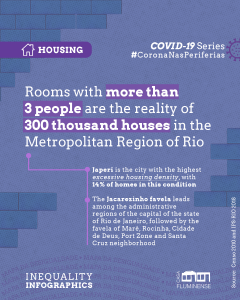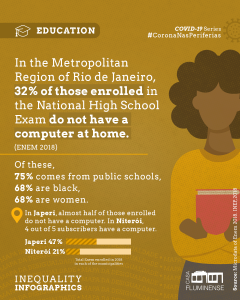Casa Fluminense works in solidarity with Rio’s civil society while imagining a new tomorrow, post Covid-19
02 Jun 2020
The arrival of the Covid-19 pandemic and the associated lockdown in the main cities of the country meant that millions of Brazilians had to quickly adapt to a new reality. Social isolation is the main tool for minimizing the effects of Covid-19 and reducing the spread of the virus. However, this isolation carries with it enormous side effects: a decrease in economic activities, an increase in unemployment, and the risk of a global recession. Can health and safety be protected without the economy collapsing? Brazil is not alone in this dilemma, with the whole world currently facing this unprecedented crisis, tasked with acting responsibly now to save lives while simultaneously reinventing the future.
When we examined the impacts of Covid-19 in Rio de Janeiro, Brazil’s second largest metropolis, we identified two main challenges. First, the crisis is making the enormous inequality present in Rio’s urban areas even more visible. Some neighbourhoods are coping well, as they have access to infrastructure and services that guarantee the well-being of residents. But look further, and those living in slums and on the peripheries of the city often live in small, makeshift homes that have little or no ventilation and which lack access to water and basic sanitation. The second challenge is the enormous population of informal workers who have lost their income during lockdown, and who – as a result – are left in an extremely vulnerable position without money to purchase food. This adds to the numbers of people in Rio who were already unemployed or in need of assistance.
Given the reality on the ground, Casa Fluminense has been working on two fronts in terms of our Covid-19 response: disseminating information on the effects of the lockdown, and mobilizing partners to work together around a coordinated response. In terms of the information we have been sharing, we started a Covid-19 Inequality Infographics Series, which is aiming to present data and information that sparks discussions on the impact of Covid-19 on those living in poverty in the Rio metropolis. In terms of mobilizing partners, we have been collaborating with local organizations – particularly in the West Zone, Baixada Fluminense and São Gonçalo – which are working to: sensitize the population about the importance of social isolation; establish solidarity networks; and, demand action from local authorities. One of these collaborations resulted in the campaign #CoronaNaBaixada, which involved a public letter being sent to local authorities, demanding protection for the most vulnerable.
Also on the mobilization front, Casa Fluminense joined the Rio Contra Corona initiative – led by the Instituto Ekloos, Instituto Phi, Banco da Previdência and the União Rio movement – which is distributing food parcels and hygiene kits to families in situations of social and economic vulnerability. In just a few weeks, the initiative brought together 48 organizations working in 134 communities, and together we distributed more than 300 tons of food through this solidarity network. Casa Fluminense participated in Rio Contra Corona in two ways: by donating resources and encouraging other donors to support the initiative; and, suggesting additional organizations in Baixada and the West Zone as members of the network. We thought it was important for Casa Fluminense to be a part of Rio Contra Corona because now, perhaps more than ever, we need to collaborate and avoid duplicating efforts – working together allows us to better serve those most in need.
What will the future look like?
In Brazil, there are many doubts and uncertainties about what life will be like after the pandemic. Nobody has the answers. Though during this period of lockdown, several online discussion spaces have emerged with the objective of discussing and reimagining a new tomorrow. I have participated in a few of these, and while much is still unknown, I think I have clarity on three points.
The first is the importance of the Unified Health System. In recent years, debates around the inefficiency of the public sector, and the need to reduce the role of the state, have increased in Brazil. However, in times of crisis, it is the state that has the responsibility and capacity to respond to all members of society. The Unified Health System is based on the principle of universality, and is intended to offer free services to all – with states and municipalities having different and complementary responsibilities to ensure that the system functions effectively. In 2017, the federal government took the decision to freeze investments into the health system for the next 20 years, though due to the current state of emergency, it has decided that such investments will start again. But will the government freeze health resources again at the end of the crisis? Or, is it possible for us to use the crisis as an opportunity, and to improve the Unified Health System by dedicating more resources to it now?
The second point is the relevance and importance of Brazilian civil society, which has been on full display during the pandemic. Countless initiatives led by NGOs, community organizations, philanthropic institutions, etc. have emerged and are doing everything in their power to minimize the impacts of the crisis (particularly for the most vulnerable). The Rio Contra Corona initiative that I mentioned above was possible due to the work of hundreds of community organizations, collectives, NGOs and social leaders who understand the reality of their neighbourhoods and the favelas, and who are able to rapidly develop and implement actions to overcome local problems, while still holding the government to account. However, despite the vital role that these organizations are playing in their communities, they are vulnerable themselves, with constant anxieties about their own financial sustainability. Therefore, for Casa Fluminense, continuing to support and strengthen the work of essential community organizations in Rio is of the utmost importance, both during and after the crisis.
The third point I am clear on is the completely irresponsible role that President Jair Bolsonaro has played in the face of this crisis. The President has continually denied the seriousness of this pandemic that has already killed hundreds of thousands of people worldwide in just a few months. He goes against the advice of the World Health Organization, Ministry of Health, scientists and world leaders, balking at guidance around social isolation. Rather than coordinating national action with governors, mayors and the national congress, he has instead created chaos and sewn confusion, leading to tension and inaction across government bodies. It is abundantly clear that everyone is concerned about the economy and livelihoods, but we need to tackle one problem at a time and the priority right now must be people’s health and lives. In parallel, measures should be developed so that the economy can reopen in a safe and responsible manner. But this all requires the capacity for dialogue and political coordination – everything that Bolsonaro does not have and does not want to have. He is not a leader that will unite the country. Quite the opposite, he instead seems intent on creating division. This is not news for many people, but for others this reality is just sinking in now.
By: Henrique Silveira, Executive Coordinator of Casa Fluminense. Casa Fluminense is a member of the Brazilian Philanthropy Network for Social Justice. This blog originally appeared in Portuguese on the Casa Fluminense website.





